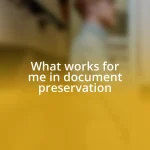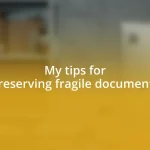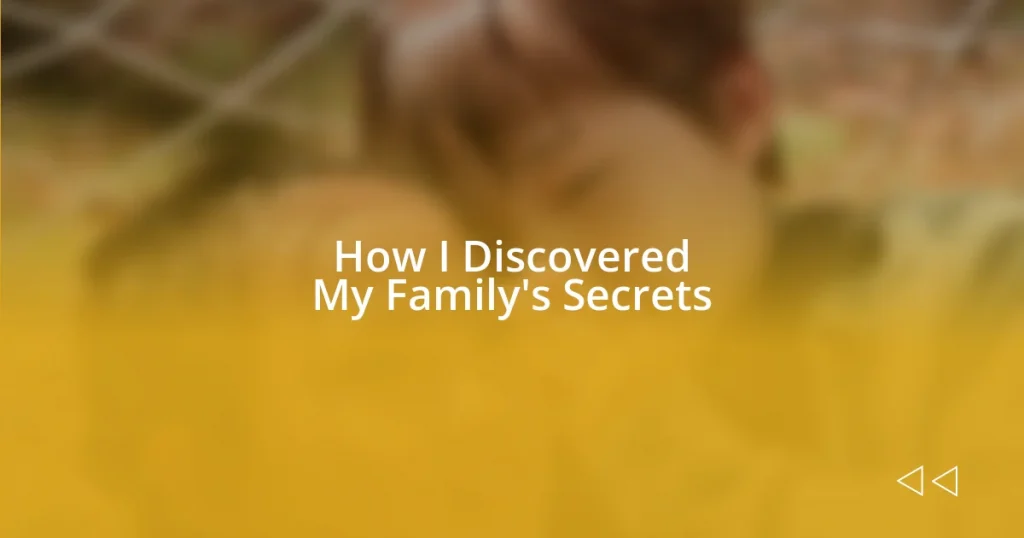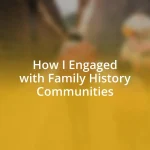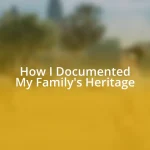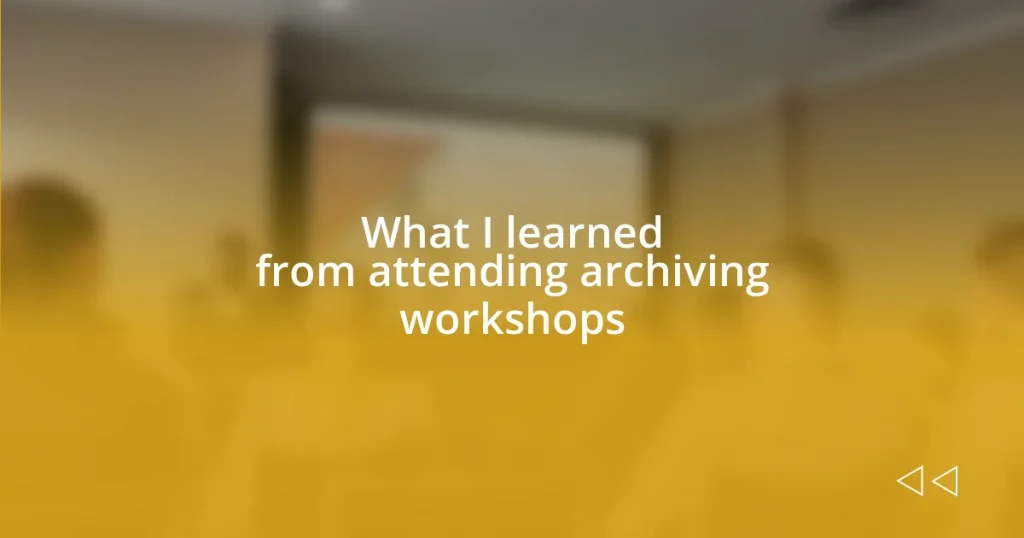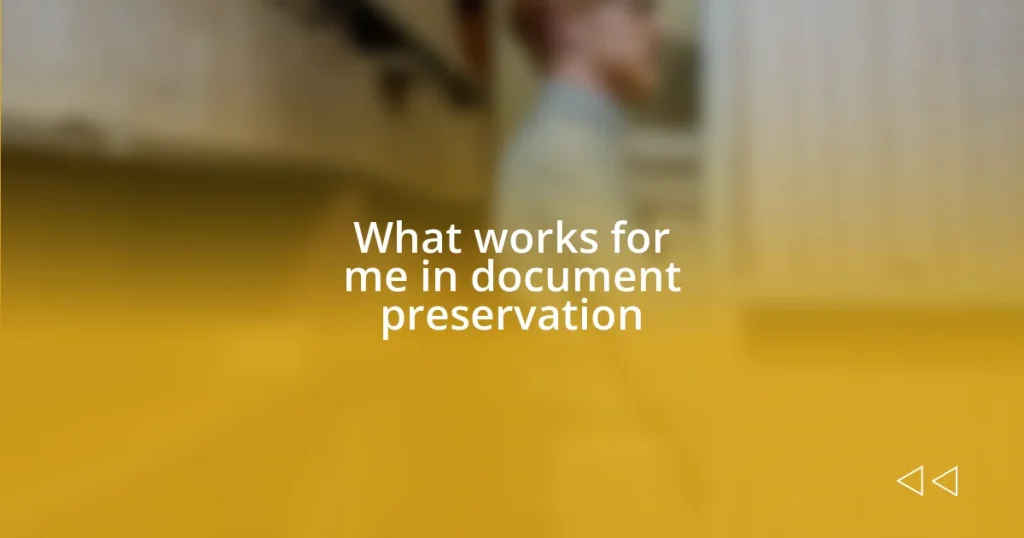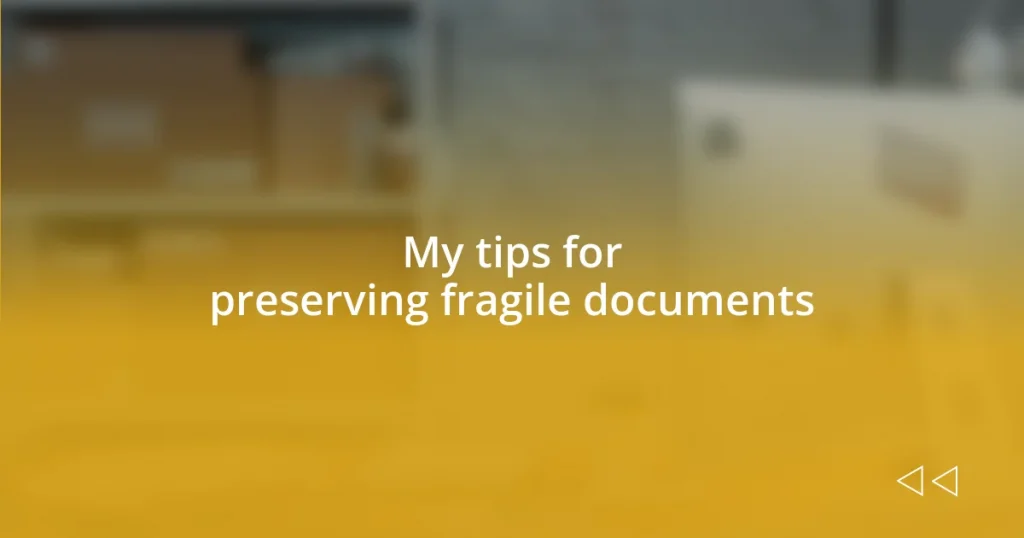Key takeaways:
- Exploring family histories fosters a deeper understanding of personal identity and connections across generations.
- Uncovering family secrets can strengthen bonds and promote empathy, while also presenting challenges and uncomfortable truths.
- Engaging in open conversations about family stories and actively listening enhances emotional connections and preserves legacies.

Understanding Family Histories
Understanding family histories can be a deeply emotional journey. I remember leafing through old photo albums, discovering faded images of relatives I had never met. Each photo seemed to whisper secrets about their lives, their struggles, and their joys, prompting me to wonder how their past shaped my present.
As I dug deeper, I found myself piecing together stories that transcended generations. I felt an almost magnetic pull to times and places that shaped my ancestors. This realization left me contemplating: How does the legacy of those who came before us influence who we are today? It became clear to me that our family histories are not just tales of the past; they’re the threads weaving together our identity.
There’s something incredible about unearthing the rich tapestry of our family stories. One afternoon, while listening to my grandmother recount tales from her childhood, I felt a profound connection to her world. It was in those shared moments that I understood how essential it is to keep these narratives alive—not merely for ourselves, but for those who come after us. Can you imagine how different our lives would be if we didn’t know where we came from? Each revelation brings us closer to our roots, enriching our understanding of both ourselves and our lineage.

Importance of Family Secrets
Family secrets play a crucial role in shaping our personal identities and familial bonds. I once stumbled upon a hidden letter in my mother’s old trunk, which revealed a long-buried family feud. This letter didn’t just inform me about past conflicts; it provided context for certain behaviors I had noticed in family dynamics. Understanding these secrets helped me navigate relationships within my own family tree more compassionately.
The impact of these secrets can also spark curiosity and foster connections between generations. I recall asking my father about his childhood, and he shared stories of his adventurous youth—stories that often veered into long-held family secrets. Each revelation brought us closer, allowing us to bond over shared experiences while understanding the challenges our ancestors faced. It’s fascinating how these stories can bridge gaps, helping us empathize with the struggles of those who came before us.
Finally, uncovering family secrets can serve as a powerful catalyst for personal growth. When I learned about my great-grandmother’s resilience during tough times, it inspired me to reflect on my own challenges and how I overcome them. Secrets can guide us, showing us pathways to resilience that might otherwise remain hidden. Isn’t it intriguing to think how the experiences of past generations can empower us in our own lives?
| Positive Aspects | Consequences |
|---|---|
| Strengthens family bonds | Can create tensions if not handled carefully |
| Fosters personal identity | Might lead to uncomfortable truths |
| Encourages empathy and understanding | Can cause generational conflicts |

Researching Family Genealogy
Diving into family genealogy is like embarking on a treasure hunt, with each discovery illuminating paths I never knew existed. I once spent hours on Ancestry.com, tracing my lineage back to the 1700s. With each click, I unearthed stories, connecting the dots between names and faces that had long faded from memory. This process isn’t just about dates and places; it’s about embracing the journeys of those who walked before us, leading to moments that still resonate today.
Here’s what I learned about researching genealogy:
– Start with family interviews: My grandmother shared the most intriguing tales that weren’t in any records.
– Utilize online databases: Websites like FamilySearch provided access to public records that painted vivid pictures of lives lived.
– Visit local libraries: I found invaluable resources in local archives, where newspapers from decades past unveiled fascinating tidbits.
– Join genealogy groups: Engaging with others on similar quests transformed my search into a community experience, where we exchanged tips and discoveries.
– Keep an organized record: Creating a family tree online helped me visually connect the dots, ensuring I didn’t lose track of the intricate stories I was weaving together.
Each step in this journey filled me with more than just information; it ignited a fire of curiosity about the legacies I inherited. Every name I added brought with it a story waiting to be told.
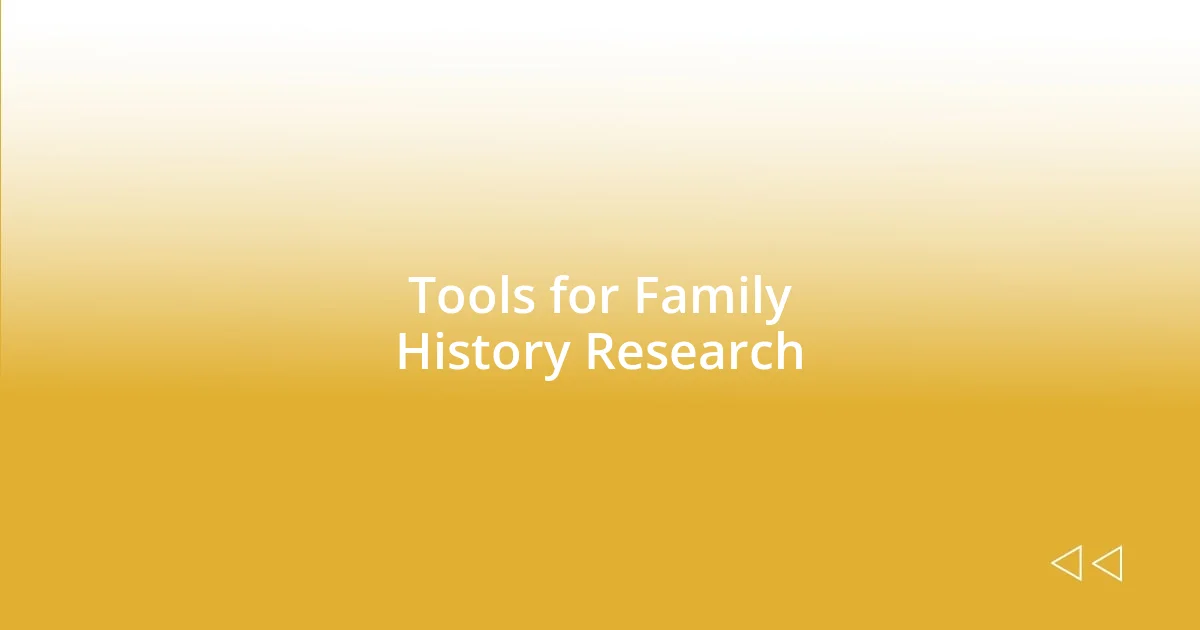
Tools for Family History Research
When it comes to tools for family history research, I’ve learned that having the right resources can make all the difference. One of my favorites is the free website FamilySearch. I vividly remember the thrill of typing in my great-grandmother’s name and watching a whole family tree unfold before my eyes. It’s incredible how such databases can connect us to distant cousins we never knew existed, often paving the way for unexpected friendships.
Another powerful tool I highly recommend is using local historical societies. They often have archives that aren’t readily available online. During a visit to my local historical society, I came across an old yearbook from my father’s high school. Flipping through its pages, I discovered not just friends and classmates but a glimpse into the world he grew up in. It made me wonder—how much do we really know about the lives our parents led before us?
Don’t underestimate the value of social media, too. I joined a few genealogy groups on Facebook, and it opened a world of advice and support. People shared their breakthroughs and challenges, sparking insights I hadn’t considered on my own. One member even helped me locate a missing branch of my family tree through a simple status update. It’s moments like these that remind me how interconnected our stories truly are. Isn’t it fascinating how a simple online interaction can lead to unlocking pieces of our history?

Uncovering Hidden Family Stories
Uncovering hidden family stories has a way of tugging at the heartstrings. I vividly remember the day I stumbled upon an old letter tucked away in my mother’s attic. The yellowed pages revealed a love story between my great-grandparents, filled with longing and uncertainty during a time of war. Reading their words made me feel a connection that transcended generations, reminding me that our family history is packed with emotion and resilience.
There was a particular afternoon when I decided to interview my eccentric uncle about our family lore. He regaled me with tales of my ancestors who were pioneers, settling in distant lands. As he spoke of courage and adventure, I found myself enthralled, realizing how these hidden stories shape the very essence of who we are today. I couldn’t help but think: how many layers of our identity are woven into these tales of bravery and struggle?
Sometimes, it’s the simplest discoveries that evoke the deepest emotions. I recall uncovering a faded photograph at a family reunion, showing my great-aunt laughing among her friends. The joy radiating from that image struck me. Who were those women? What dreams did they have? In that moment, I realized that every photo, every story has the power to breathe life into the past, compelling us to honor and understand our roots. Isn’t it incredible how these fragments of history can inspire us to reflect on our own lives?
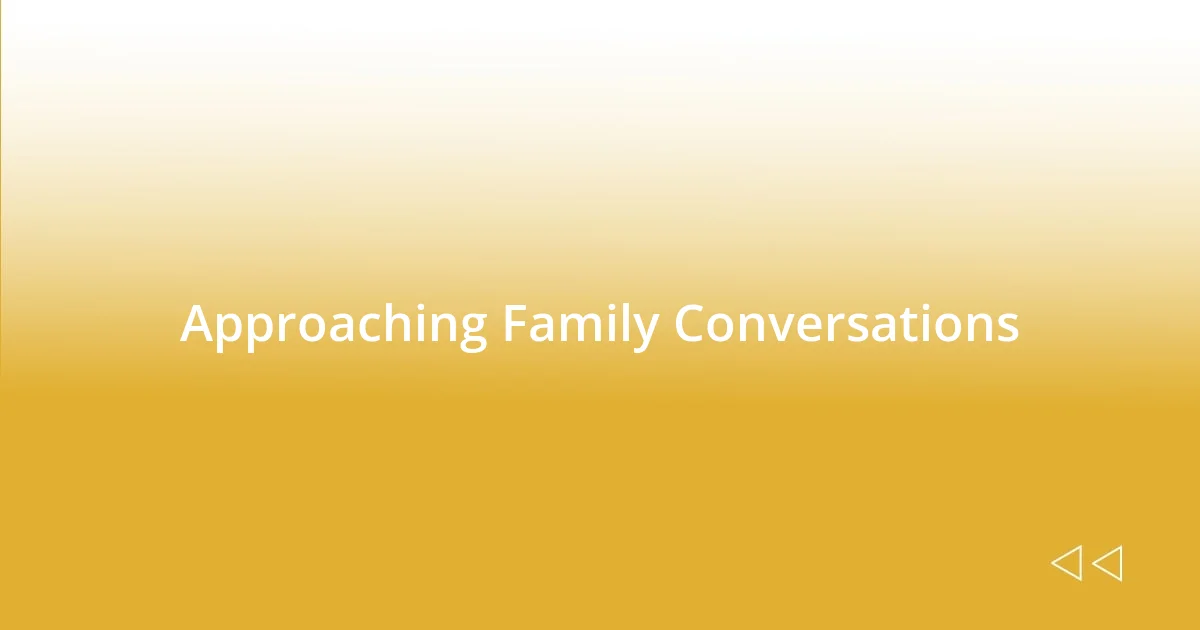
Approaching Family Conversations
Approaching family conversations can feel daunting, especially when you’re diving into sensitive topics. I remember one evening sitting around the dinner table, hesitantly bringing up my desire to learn more about my family’s past. Suddenly, a hush fell over the room, and I realized just how closely guarded some stories are. It was a delicate moment, reminding me that timing and setting matter greatly when initiating these discussions.
As I sat there, I noticed that asking open-ended questions could help ease the tension. I shifted my approach, asking my mother about her childhood memories instead of directly inquiring about hidden family secrets. That’s when I discovered not only stories but also the laughter and warmth of her experiences. Isn’t it powerful how a shift in conversation can unlock cherished memories, revealing the heart behind our family narratives?
I’ve found that actively listening is just as crucial. One afternoon, when I broached the topic with my grandfather, I let him speak at his own pace, even when silence lingered. Eventually, he shared tales that painted vivid pictures of the struggles he faced in his early years. His eyes glistened with nostalgia, and I felt honored to be a part of that moment. How often do we pause to genuinely listen to the wisdom of our elders? It’s in those moments of connection that family secrets begin to surface, wrapped in layers of shared love and trust.

Preserving Family Legacies
There’s an undeniable beauty in preserving family legacies; they tell our unique stories and validate our experiences. I remember painstakingly sorting through boxes of my grandmother’s belongings when I inherited her old trunk. Inside, I discovered a collection of handwritten recipes that weren’t just meals but reflections of her love poured into every dish. Each recipe felt like a piece of her soul, and it struck me that sharing these culinary treasures could keep her spirit alive during family gatherings. Don’t you think these tangible reminders can strengthen our connection to the past?
I’ve also learned that creating a family tree can be a meaningful way to document our lineage. When I finally mapped out my family’s history, I felt an overwhelming sense of pride. It was powerful to visualize connections that spanned decades and continents, like an intricate tapestry weaving us all together. Have you ever traced your roots? It can be a fascinating journey, revealing surprises that deepen our understanding of ourselves and the legacies we inherit.
Sometimes, simply sharing stories at family gatherings cultivates a deeper appreciation for our heritage. I recall one Thanksgiving when we decided to dedicate a few moments to share memorable anecdotes about family members. Laughter erupted as we recounted our favorite tales, and I felt a sense of warmth enveloping the room. Those stories, rich with nostalgia and humor, didn’t just entertain; they connected us in a profound way. Isn’t it remarkable how sharing our stories can turn one family dinner into a cherished ritual that honors our legacies?

